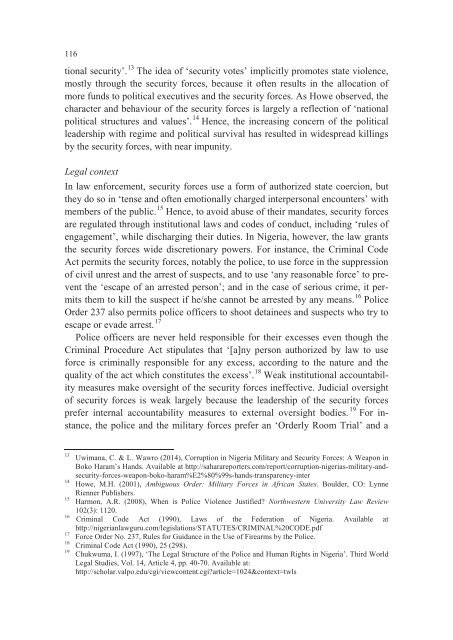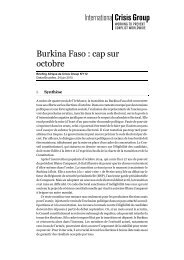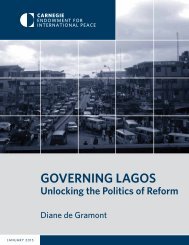Violence in Nigeria
ASC-075287668-3743-01
ASC-075287668-3743-01
Create successful ePaper yourself
Turn your PDF publications into a flip-book with our unique Google optimized e-Paper software.
116<br />
tional security’. 13 The idea of ‘security votes’ implicitly promotes state violence,<br />
mostly through the security forces, because it often results <strong>in</strong> the allocation of<br />
more funds to political executives and the security forces. As Howe observed, the<br />
character and behaviour of the security forces is largely a reflection of ‘national<br />
political structures and values’. 14 Hence, the <strong>in</strong>creas<strong>in</strong>g concern of the political<br />
leadership with regime and political survival has resulted <strong>in</strong> widespread kill<strong>in</strong>gs<br />
by the security forces, with near impunity.<br />
Legal context<br />
In law enforcement, security forces use a form of authorized state coercion, but<br />
they do so <strong>in</strong> ‘tense and often emotionally charged <strong>in</strong>terpersonal encounters’ with<br />
members of the public. 15 Hence, to avoid abuse of their mandates, security forces<br />
are regulated through <strong>in</strong>stitutional laws and codes of conduct, <strong>in</strong>clud<strong>in</strong>g ‘rules of<br />
engagement’, while discharg<strong>in</strong>g their duties. In <strong>Nigeria</strong>, however, the law grants<br />
the security forces wide discretionary powers. For <strong>in</strong>stance, the Crim<strong>in</strong>al Code<br />
Act permits the security forces, notably the police, to use force <strong>in</strong> the suppression<br />
of civil unrest and the arrest of suspects, and to use ‘any reasonable force’ to prevent<br />
the ‘escape of an arrested person’; and <strong>in</strong> the case of serious crime, it permits<br />
them to kill the suspect if he/she cannot be arrested by any means. 16 Police<br />
Order 237 also permits police officers to shoot deta<strong>in</strong>ees and suspects who try to<br />
escape or evade arrest. 17<br />
Police officers are never held responsible for their excesses even though the<br />
Crim<strong>in</strong>al Procedure Act stipulates that ‘[a]ny person authorized by law to use<br />
force is crim<strong>in</strong>ally responsible for any excess, accord<strong>in</strong>g to the nature and the<br />
quality of the act which constitutes the excess’. 18 Weak <strong>in</strong>stitutional accountability<br />
measures make oversight of the security forces <strong>in</strong>effective. Judicial oversight<br />
of security forces is weak largely because the leadership of the security forces<br />
prefer <strong>in</strong>ternal accountability measures to external oversight bodies. 19 For <strong>in</strong>stance,<br />
the police and the military forces prefer an ‘Orderly Room Trial’ and a<br />
13<br />
14<br />
15<br />
16<br />
17<br />
18<br />
19<br />
Uwimana, C. & L. Wawro (2014), Corruption <strong>in</strong> <strong>Nigeria</strong> Military and Security Forces: A Weapon <strong>in</strong><br />
Boko Haram’s Hands. Available at http://saharareporters.com/report/corruption-nigerias-military-andsecurity-forces-weapon-boko-haram%E2%80%99s-hands-transparency-<strong>in</strong>ter<br />
Howe, M.H. (2001), Ambiguous Order: Military Forces <strong>in</strong> African States. Boulder, CO: Lynne<br />
Rienner Publishers.<br />
Harmon, A.R. (2008), When is Police <strong>Violence</strong> Justified? Northwestern University Law Review<br />
102(3): 1120.<br />
Crim<strong>in</strong>al Code Act (1990), Laws of the Federation of <strong>Nigeria</strong>. Available at<br />
http://nigerianlawguru.com/legislations/STATUTES/CRIMINAL%20CODE.pdf<br />
Force Order No. 237, Rules for Guidance <strong>in</strong> the Use of Firearms by the Police.<br />
Crim<strong>in</strong>al Code Act (1990), 25 (298).<br />
Chukwuma, I. (1997), ‘The Legal Structure of the Police and Human Rights <strong>in</strong> <strong>Nigeria</strong>’. Third World<br />
Legal Studies, Vol. 14, Article 4, pp. 40-70. Available at:<br />
http://scholar.valpo.edu/cgi/viewcontent.cgi?article=1024&context=twls






